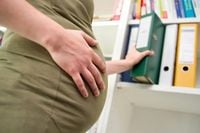The Merz government in Germany is set to implement a significant change to maternity protection laws, a move that could have far-reaching implications for millions of women across the country. This new initiative, announced in the coalition agreement between the CDU/CSU and SPD, aims to extend maternity protection to self-employed women, a group that has historically been excluded from such benefits.
Currently, maternity protection applies exclusively to women in employment, regardless of their marital status or nationality, as long as they are working in Germany or under German law. This protection includes a release from work, maternity benefits, and special provisions to ensure health and safety during pregnancy and after childbirth. The law mandates that employers adhere to these regulations, which are designed to safeguard the well-being of both mothers and their newborns.
Under the new plan, which is expected to take effect on June 1, 2025, maternity protection will also cover women who experience a miscarriage after the 13th week of pregnancy. This change addresses a significant gap in the current legislation, which previously only provided protection for miscarriages occurring after the 24th week. The extension aims to give women more time to recover physically and emotionally from such traumatic experiences.
The maternity protection period typically begins six weeks before the expected due date and lasts for eight weeks post-birth, totaling 14 weeks. During this time, women are entitled to special protection against dismissal and are prohibited from working if it poses a health risk to themselves or their child. Employers are required to explore all options to continue employing women on maternity leave, ensuring their income is secured during this critical period.
In 2023, approximately 5.8 percent of all employed women in Germany were self-employed, indicating a substantial number of women who could benefit from the proposed changes. However, housewives and adoptive mothers currently remain outside the scope of maternity protection, a situation that is unlikely to change under the new government.
The coalition agreement outlines that the government will examine various financing models to support the implementation of these changes. It also mentions plans to collaborate with the insurance industry to develop concepts that will secure businesses affected by the new maternity protection laws. An information campaign is also in the works to raise awareness about the revised maternity protection provisions.
Despite the positive steps forward, there has been ongoing debate about the adequacy of maternity protection for self-employed women. Advocates have long argued that these women deserve the same protections as their employed counterparts, especially as they navigate the challenges of balancing work and family responsibilities.
The recent announcement has garnered mixed reactions. Supporters of the reform argue that it is a necessary step towards gender equality in the workplace, acknowledging the unique challenges faced by self-employed women during pregnancy and childbirth. Critics, however, express concerns about the feasibility of implementing such protections and the potential impact on small businesses that may struggle to accommodate these new regulations.
In addition to extending maternity protection, the Merz government is also focusing on improving the overall framework for working mothers. This includes examining existing policies and exploring innovative solutions that can enhance the work-life balance for women across various sectors.
As the government prepares to roll out these changes, many are eager to see how they will be implemented in practice. The upcoming months will likely bring further details on financing models and specific guidelines for employers, ensuring that the new maternity protection laws are not only well-intentioned but also practical and sustainable.
In summary, the proposed changes to maternity protection laws represent a significant shift in how Germany supports mothers, particularly those who are self-employed. By extending these protections, the government aims to create a more inclusive environment for all women, acknowledging the vital role they play in the workforce and society.






